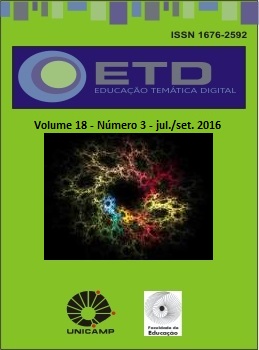Resumo
The article approaches the graduation of the educator in the contemporaneity, investigating the processes of teaching and learning through emerging digital technologies (DTs). The DTs can be understood as acquaintanceship places, while they enable the representation of the perception about the knowledge, the dialogical relationship and the interaction among participants. In other words, thinking the human being regarding the other. The problem includes two aspects: the context of the digital technological hybridism and the constitution of the virtual acquaintanceship. The reflection about this problem took place during the initial graduation courses of the educator, developed in Brazil and in France, in the digital technological hybridism context – composed by DTs: Learning Virtual Environment; Instant Communicator; Blog and Metaverse. The empirical data resulted from the process of interaction and representation of perception of the participants in the proposed activities. Those data were submitted to the methodology of content analysis. Thus, in the research, we evidenced that the constitution of virtual digital acquaintanceship occurs through: thrilling encounters, the aesthetics that founds the “tribes”; the daily “being-together” that is established in sociality and otherness; the dialogical relationships in the interaction processes; the structural coupling established in acquaintanceship. Therefore, we believe that in the educational context, the development of problematizing (disturbance) pedagogical practicing of the daily living and living together is important, in congruency with the DTs that potentiates the interaction.Referências
BACKES, Luciana. A configuração do espaço de convivência digital virtual: a cultura emergente no processo de formação do educador. 2011. 363 f. Tese (Doutorado em Educação) – Universidade do Vale do Rio dos Sinos, São Leopoldo, RS, 2011. Available in: <http://goo.gl/B96pV7>. Access in: 14 June. 2016.
BACKES, Luciana. Espaço de convivência digital virtual (ECODI): o acoplamento estrutural no processo de interação. Educação Temática Digital, Campinas, SP, v. 15, n. 01, p. 337-355. mai./ago. 2013. Available in: <http://goo.gl/nSLZpO>. Access in: 14 June 2016. ISSN 1676-2592.
BACKES, Luciana. O hibridismo tecnológico digital na configuração do espaço digital virtual de convivência: formação do educador. Inter-Ação, Goiânia, GO, v. 40, n. 03, p. 435-456. set./dez. 2015. Available in: <http://goo.gl/vfa4WV>. Access in: 14 June 2016. ISSN 1981-8416.
BARDIN, Laurence. Análise de conteúdo. São Paulo: Edições 70, 2011.
COSTA, Rosmeri Ceconi. Interação em mundos digitais virtuais: uma investigação sobre a representação do emocionar na aprendizagem. 2008. 181 f. Dissertação (Mestrado em Educação) – Universidade do Vale do Rio dos Sinos, São Leopoldo, RS, 2008. Available in: <http://goo.gl/2wpGsx>. Access in: 14 June 2016.
FREIRE, Paulo, SHOR, Isa. Medo e ousadia: cotidiano do professor. Rio de Janeiro: Paz e Terra, 1992. Available in:: <http://goo.gl/0YdmAS>. Access in: 14 June 2016.
HUGON, Stéphane. Soudain: la technique. Les cahiers européens de l’imaginaire: technomagie, v. 03, n. 01, p. 62-69. 2011.
LATOUR, Bruno. Nous n’avons jamais été modernes, essai d’anthropologie symétrique. Paris: Éd. La Découverte, 1991.
LATOUR, Bruno. Politiques de la nature. Comment faire entrer les sciences en démocratie. Paris: Éd. La Découverte, 1999.
LEMOS, André. Cibercultura: tecnologia e vida social na cultura contemporânea. Porto Alegre: Sulina, 2007.
LEMOS, André. Mobile communication and news sense of places: a critique of spatialization in cyberculture. Galáxia, São Paulo, SP, v. 16, n. 01, p. 91-108. dez. 2008. Available in: <http://goo.gl/H9oY0j>. Access in: 14 June 2016. ISSN 1982-2553.
LÉVY, Jacques ; LASSAULT, Michel. Dictionnaire de la géographie et de l’espace des sociétés. Paris: Belin, 2003.
MAFFESOLI, Michel. Le temps des tribus. Le déclin de l’individualisme dans les sociétés de masse. Paris : La Table Ronde, 2000.
MAFFESOLI, Michel. O imaginário é uma realidade. FAMECOS : mídia, cultura e tecnologia, Porto Alegre, RS, v. 15, n. 01, p. 74-82. ago. 2001. Available in: <http://goo.gl/ojFXsf>. Access in: 14 June 2016. ISSN 1980-3729.
MAFFESOLI, Michel. Perspectivas tribais ou a mudança do paradigma social. FAMECOS: mídia, cultuar e tecnologia, Porto Alegre, RS, v. 23, n. 01, p. 23-29. Abr. 2004. Available in: <http://200.144.189.42/ojs/index.php/famecos/article/view/364/295>. Access in: 14 June 2016. ISSN 1980-3729.
MAFFESOLI, Michel. Les mémoires des tribus et le ré-enchantement du monde. In: CASALEGNO, Federico. Mémoire quotidienne: communautés et communication à l'ère des réseauxpp. Québec: Presses de l'Université Laval. p. 129-146.
MAFFESOLI, Michel. Comunidade de destino. Horizontes Antropológicos, Porto Alegre, RS, v. 12, n. 25, p. 273-283. jan./jun. 2006. Available in: <http://goo.gl/7NXVcP>. Access in: 14 June 2016. ISSN 1806-9983.
MAFFESOLI, Michel. L’initiation au présent. Les cahiers européens de l’imaginaire: technomagie, v. 03, n. 01, p. 14-27. 2011.
MAFFESOLI, Michel. O tempo retorna: Formas elementares da pós-modernidade. Rio de Janeiro: Forense Universitária, 2012.
MATURANA, Humberto Romesín. Uma nova concepção de aprendizagem. Dois Pontos, Curitiba, PR, v. 15, n. 01, p. 28-35. 1993.
MATURANA, Humberto Romesín. Transformación en la convivência. Santiago de Chile: Dólmen Ediciones, 1999.
MATURANA, Humberto Romesín; VARELA, Francisco. A árvore do conhecimento: as bases biológicas da compreensão humana. São Paulo: Palas Athena, 2002. Available in: <http://goo.gl/UGBc4X>. Access in: 14 June 2016.
MORAES, Maria Cândida. Educar na biologia do amor e da solidariedade. Petrópolis: Vozes, 2003.
SANTAELLA, Lúcia. A ecologia pluralista da comunicação: conectividade, mobilidade, ubiquidade. São Paulo: Paulus, 2010.
SANTOS, Milton. Por uma geografia nova: da crítica da geografia a uma geografia crítica. São Paulo: Editora HUCITEC, 1980.
SCHLEMMER, Eliane; MALIZIA, Pierfranco; MORETTI, Gaia et al. Comunidades de aprendizagem e de prática em metaverso. São Paulo: Cortez, 2012.
SOUZA; SILVA, Adriana. (2006). Do ciber ao híbrido: tecnologias móveis como interfaces de espaços híbridos. In: ARAÚJO, Denize Correa (Org.) Imagem (ir) realidade: comunicação e cibercultura. Porto Alegre: Sulina, 2006. p. 21-51.
A ETD - Educação Temática Digital utiliza a licença do Creative Commons (CC), preservando assim, a integridade dos artigos em ambiente de acesso aberto.

